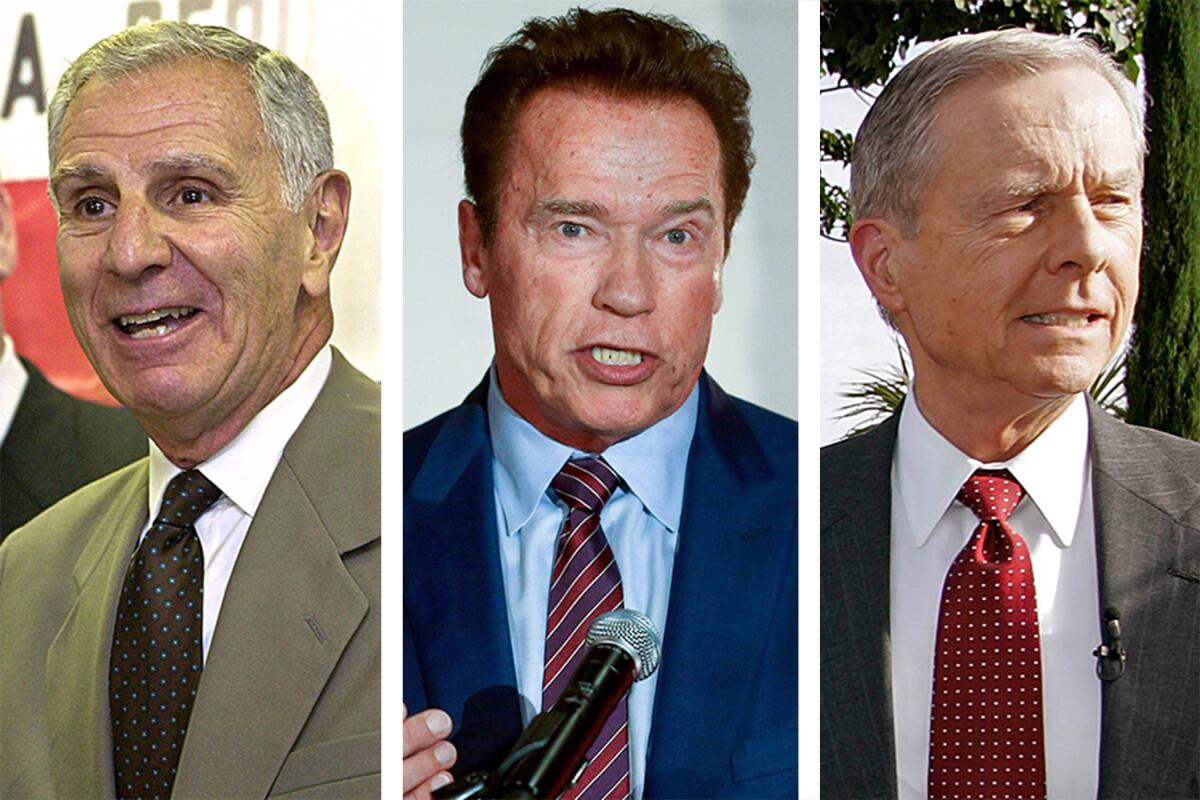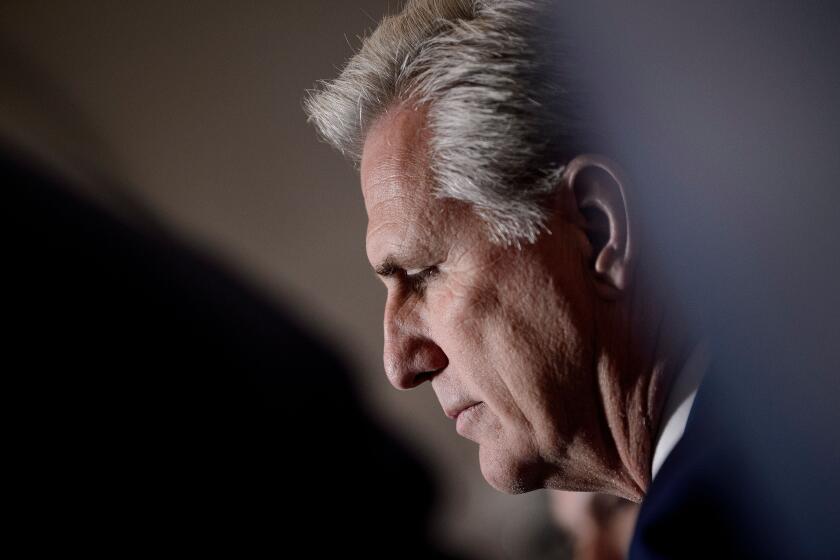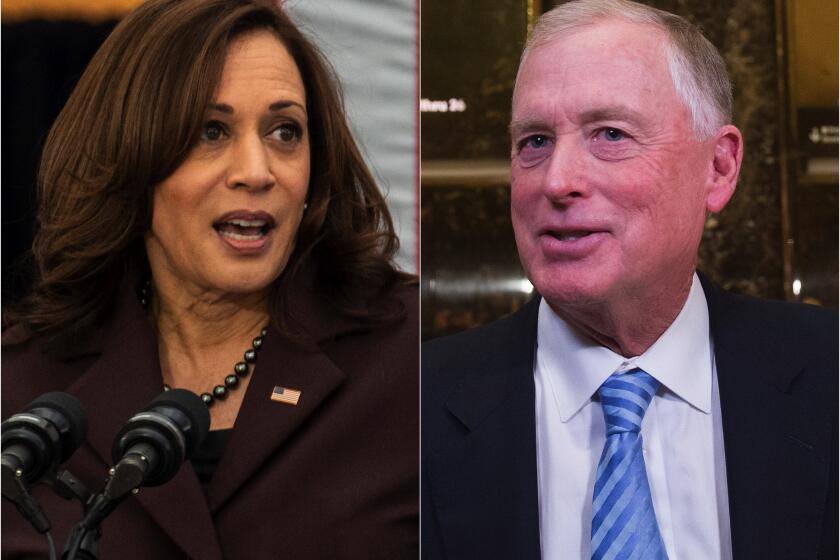Will Republicans ever be relevant again in California? Probably. But first...

- Share via
Barring something extraordinary, like, say, being caught on videotape dynamiting the Golden Gate Bridge, Gavin Newsom will be reelected as California governor in November.
And even if Newsom were to be jailed and convicted of such a nefarious assault on the Bay Area landmark, it is virtually certain he’d be succeeded by one or another of his fellow Democrats.
It’s been a decade-and-a-half since a Republican won statewide office in California and more than a quarter of a century since the once-dominant GOP controlled either legislative chamber. The ranks of Republican lawmakers in Sacramento are so shrunken they have about as much say over legislation as the shrubbery growing outside the Capitol.
None of which is good for California.
Depicting Rep. Marjorie Taylor Greene as a 1st Amendment martyr shows House Republican leader Kevin McCarthy’s lack of integrity.
Politicians and political parties need serious competition to hold them in check, keep them honest and avoid arrogance and overreach.
For our system of self-government to keep working, voters need to feel as though they have a voice and stake in the actions of their elected leaders.
Millions of Californians, who either identify as Republican or conservative, feel unheard and unseen in Sacramento, bobbing like red pinpoints in an ocean of blue. That alienation was a major impetus behind last year’s fruitless and extravagantly wasteful effort to recall Newsom and feeds the perpetual — if fanciful — talk of breaking off a chunk of rural California and creating a 51st state.
So what will it take for Republicans to regain relevancy and for California to once more benefit from a healthy and competitive two-party system?
The short answer is winning the governorship, not just electing more lawmakers to the Assembly and Senate, or to other statewide offices — though that would certainly help.
“In California, governor is an exceedingly powerful position,” said Marty Wilson, a former advisor to Pete Wilson and no relation to the ex-governor. “You’ve got a media platform. You make appointments. You can raise money for yourself as well as other candidates.”
Not least, a Republican chief executive could rebrand the party and improve its acrid image in the state.
Even before Donald Trump came along and warped the GOP into something resembling a zombie cult, the national Republican Party was seen in California as increasingly harsh, intolerant and beholden to its white Southern base. That guilt by association has hurt any candidate running statewide under the party banner.
Winning the governorship will require a different kind of Republican than most of those put forth over the last two decades — which is to say one capable of winning over more than a limited slice of the electorate.
California is a Democratic state, but not a flamingly liberal one. When Republicans got behind gubernatorial candidates who appealed to voters at or near the center — George Deukmejian, Wilson, Arnold Schwarzenegger — they succeeded. (Notably, the first time the politically moderate Schwarzenegger ran was in the 2003 recall election, a free-for-all of 135 candidates on a single ballot, avoiding a Republican primary he might well have lost.)
More often, the party has rallied behind gubernatorial hopefuls — the hapless Bill Simon Jr., vapid John Cox, combustible Larry Elder — who excited the most ardently conservative Californians but were too inept or extreme for a majority of voters to swallow.
In theory, when — or if — things get bad enough under one-party Democratic rule, a meaningful number of voters will be amenable to giving Republicans another look. Call it the wreckage-and-ruin road to party redemption.
“A Democratic screw-up would open the door,” said Jack Pitney, a politics professor at Claremont McKenna College and former Republican National Committee staffer. But even then, he said, “It takes a quality Republican to walk through it... Somebody who’s qualified, reasonable and pays attention to governance.”
Harris is just the latest vice president to learn the job is ripe for ridicule.
To that point, if Republicans want the California GOP to be more than a regional party, they’ll need to reject the nihilistic, torch-it-all mentality that has become the animating philosophy of Trump’s grievance-fueled comeback effort.
“The Republican Party is now a counterculture movement,” said Mike Madrid, a former political director of the California Republican Party and co-founder of the Trump-taunting Lincoln Project. “It’s anti-establishment and anti- the institutions that dominate society, like media and academia and government. It’s more about tearing down institutions than building them up or partnering to improve them.
“As the old adage says, you have to be for something to unite people behind an agenda,” Madrid said. “It’s hard to make the case for a party without a platform and a party where the only inviolate orthodoxy is fealty to the leader.”
For the good of the GOP — and the good of California — Republicans need to stop their self-gratifying but ultimately self-defeating political behavior. Quit pushing Trump’s lies about election fraud. Put forth serious proposals rather than simply take potshots with the intent of “owning the libs.” Quit litmus-testing gubernatorial candidates and rejecting those who are less than 100% ideologically pure.
Otherwise, the GOP will keep burning bridges — and losing statewide elections — for a long time to come.
More to Read
Get the latest from Mark Z. Barabak
Focusing on politics out West, from the Golden Gate to the U.S. Capitol.
You may occasionally receive promotional content from the Los Angeles Times.













